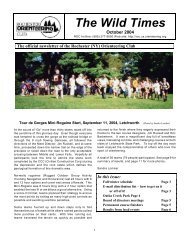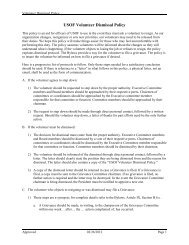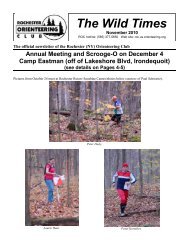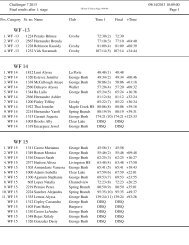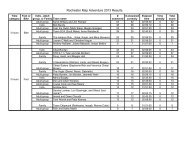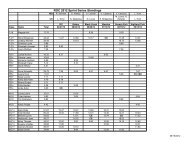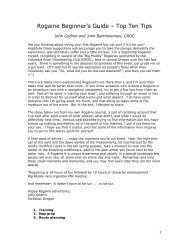A Rules for Foot Orienteering Events - Orienteering USA
A Rules for Foot Orienteering Events - Orienteering USA
A Rules for Foot Orienteering Events - Orienteering USA
You also want an ePaper? Increase the reach of your titles
YUMPU automatically turns print PDFs into web optimized ePapers that Google loves.
B.18.1 It is normal to have a period of planning time after issuance of the maps be<strong>for</strong>e<br />
competitors are allowed on the course, and this time is not counted in the duration<br />
of the event. A typical time allowance is two hours <strong>for</strong> a 24-hour event. This time<br />
should be stated in the meet announcement.<br />
B.19 Scoring<br />
B.19.1 The event shall end at precisely the set number of hours after the actual starting<br />
time, both times as defined by the organizers' clock.<br />
B.19.2 Teams finishing late will be penalized at the rate per minute or part thereof<br />
specified in advance by the organizers.<br />
B.19.3 Teams finishing more than thirty minutes late shall be deemed ineligible <strong>for</strong> a<br />
placing and their result shall be recorded as overtime (OVT).<br />
B.19.4 A team score shall be the value of the checkpoints visited and correctly verified in<br />
accordance with these rules, less any penalties. The team with the greatest score<br />
or in the event of a tie the team that finished earlier shall be awarded the higher<br />
placing.<br />
B.19.5 The most common scoring schemes use the number used as the control code of<br />
the checkpoint to give the score value <strong>for</strong> the control. Usually it is worth either the<br />
value of the control code rounded down to the next lower multiple of 10 (e.g.<br />
control 67 is worth 60 points), or else exactly the value of the control number.<br />
Points are deducted <strong>for</strong> being overtime. The most common deduction scheme is<br />
10 points per minute late. Other schemes might be acceptable, but should be<br />
explicitly discussed and explained at the time of a sanctioning request. Other<br />
scoring methods could be submitted to the sanctioning committee <strong>for</strong><br />
consideration, but different schemes tried in the past have generally met with<br />
competitor dissatisfaction.<br />
B.19.6 In the event of a checkpoint being damaged or deemed misplaced or missing by<br />
the organizers, teams shall be awarded the checkpoint score:<br />
B.20 Awards<br />
a) If the punch is missing or damaged but the team has a correct record on<br />
the intention sheet.<br />
b) If the punch is missing and there is no intention sheet, but the team can<br />
satisfy the organizers that they visited the correct site.<br />
c) If a checkpoint is missing or misplaced but the team can satisfy the<br />
organizers that they visited the correct site.<br />
d) For a correctly recorded visit to a misplaced checkpoint.<br />
B.20.1 Awards will be given to the first three places in all categories, but a single<br />
physical award may be used <strong>for</strong> a team which has achieved awards in multiple<br />
categories.





